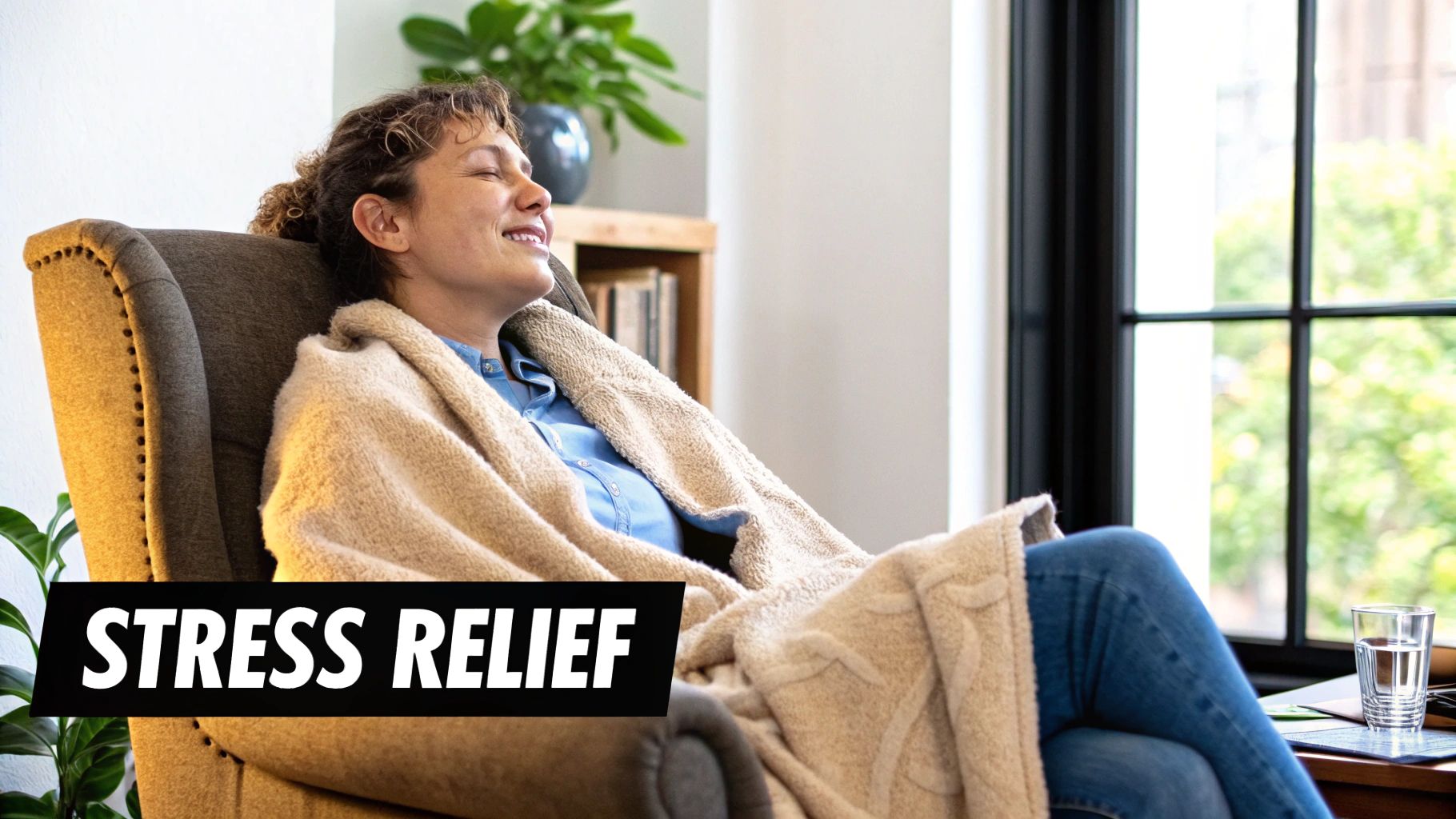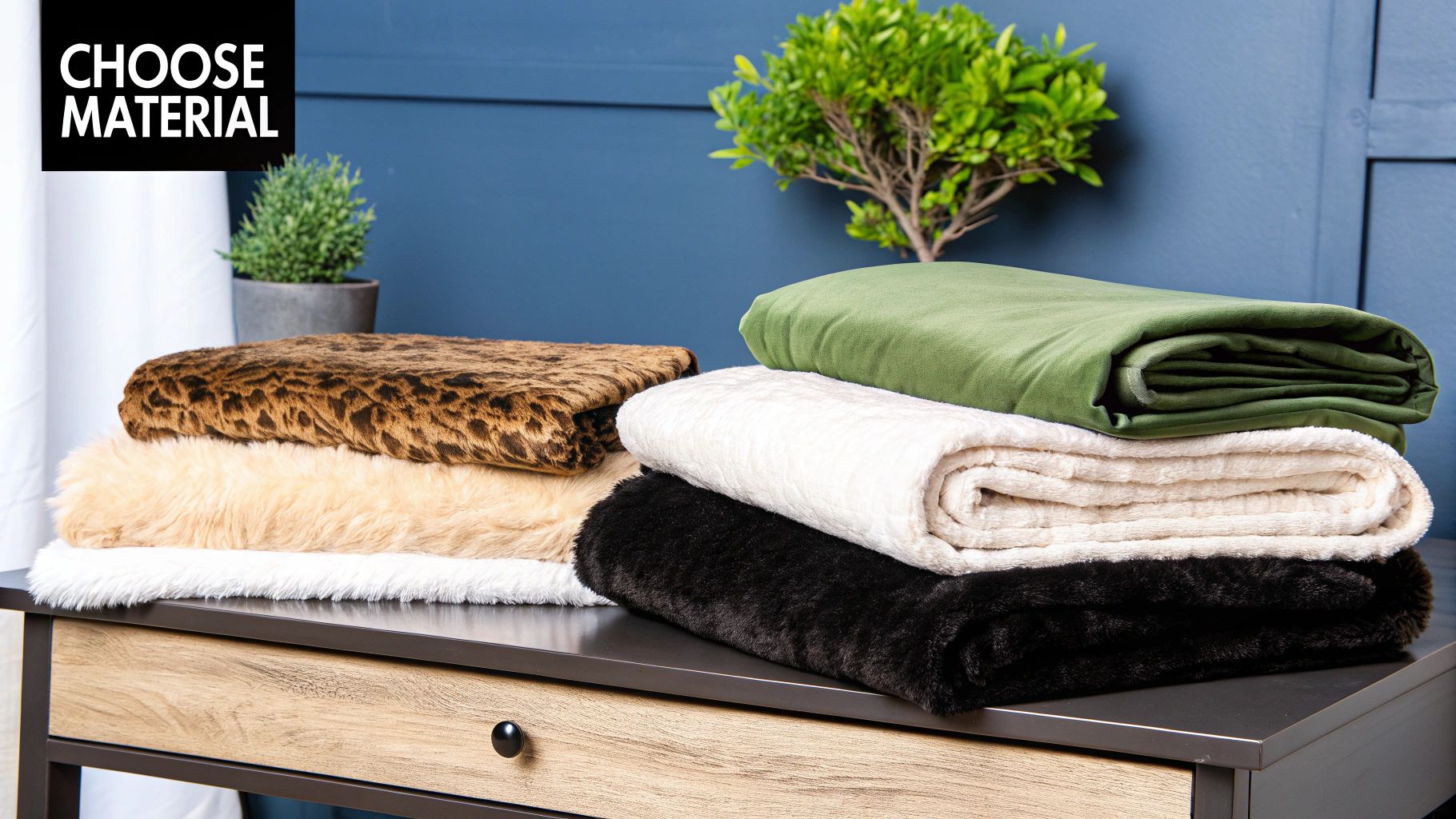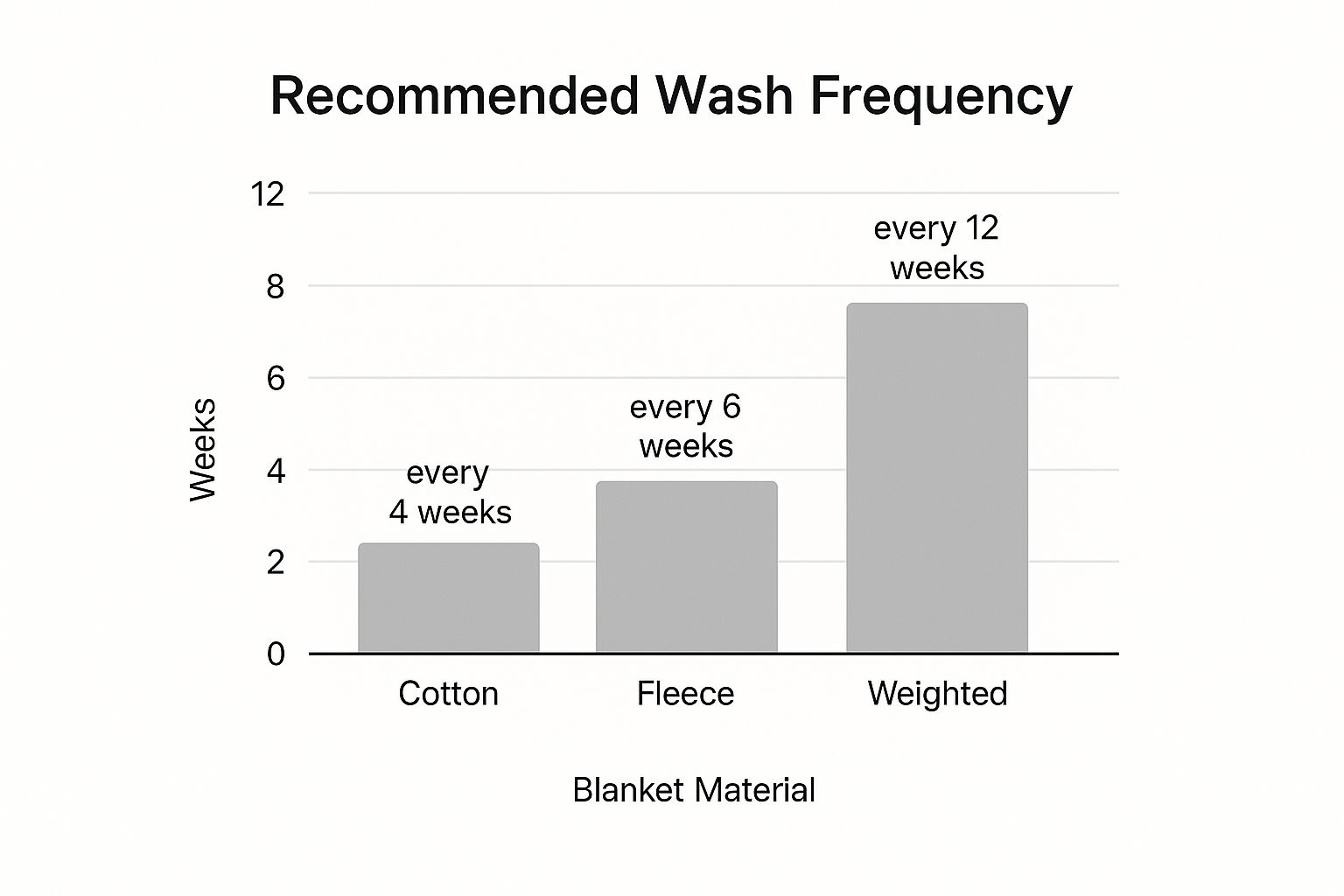Why Your Nervous System Craves Comfort Blanket Adults
Ever feel like your nervous system is running a marathon it never signed up for? Constantly bombarded by stress, deadlines, and everything in between, it's no wonder so many of us feel overwhelmed. It's like having an air traffic controller trying to manage a hundred planes at once – eventually, things are bound to get chaotic.
Comfort blankets, particularly weighted blankets, offer a much-needed respite for this overstimulated system. They act like a gentle hug for your nervous system, providing a sense of calm and grounding. But how do they actually work?
The secret lies in deep pressure stimulation, or DPS. Imagine a warm, comforting hug – that feeling of being held and secure. That’s the essence of DPS. Weighted blankets mimic this sensation, applying gentle, distributed pressure across your body.
This image of a weighted blanket draped over a duvet gives you a visual sense of its heft and drape. That added weight is what provides the comforting pressure we’re talking about.
This deep pressure triggers a fascinating chain reaction within your body. Studies show that DPS can lower cortisol, the stress hormone, by as much as 31%. At the same time, it boosts the production of serotonin, a neurotransmitter associated with well-being and tranquility. Someone dealing with anxiety, for instance, might find that the weight of a comfort blanket helps quiet their racing thoughts and brings a sense of stability.
Furthermore, this gentle pressure encourages the release of melatonin, the hormone that regulates sleep. This explains why many adults using comfort blankets report noticeably better sleep. So, these blankets aren’t just about cozying up; they're a powerful tool for both relaxation and improved sleep.
For those who find traditional relaxation techniques like meditation challenging, comfort blankets offer a different path. This tactile approach taps into a fundamental human need for comfort and security. The feeling of being held, or even swaddled, creates a sense of safety and calm, allowing the nervous system to finally relax.
The Research Behind Adult Comfort Blankets

Ever snuggle under a heavy blanket and feel instantly calmer? It's more than just coziness. There's a fascinating field of research exploring why comfort blankets are so effective for stress and sleep. It's changing how we think about comfort and its impact on well-being.
One key area of study is sleep quality. Research shows comfort blankets can boost sleep scores by a remarkable 42%. Imagine waking up truly rested, not just less tired. This improvement is largely thanks to deep pressure stimulation (DPS).
DPS mimics a firm hug, setting off a chain reaction in your body that encourages relaxation and sleep. It's like a gentle, constant reassurance whispering, "Everything's alright, time to rest."
Think of it like this: your nervous system is a buzzing phone line. DPS is like hitting the "mute" button, quieting the noise and allowing your body to relax.
Additionally, studies reveal a significant drop in nighttime anxiety among adults using comfort blankets. The gentle pressure acts like a silent lullaby, calming racing thoughts and easing the transition to sleep. This is especially helpful for those with insomnia or sleep-related anxieties. You might be interested in: The Neuroscience of Insomnia: Can a Memory Foam Neck Pillow Reset Your Sleep Cycle?
How Comfort Blankets Mimic Therapeutic Techniques
Comfort blankets aren't effective by accident. They mirror techniques used by occupational therapists and other healthcare professionals. The weight and pressure are carefully chosen to trigger the body's natural relaxation response. It’s not just about feeling cozy; it's about strategically activating specific neurological pathways.
The ideal pressure isn't random. It’s based on your body weight and nervous system. Sleep specialists often suggest a blanket around 10% of your body weight, though this can vary. This personalized approach is key to maximizing the benefits.
Real-World Benefits of Comfort Blankets
The benefits of comfort blankets go beyond general stress and sleep improvement. Studies show their effectiveness in managing conditions like insomnia, PTSD, and chronic stress.
For people with PTSD, the deep pressure can create a sense of safety, reducing flashbacks and nightmares. For those with chronic stress, the blanket offers a welcome break, promoting relaxation and reducing cortisol levels.
Let's look at a concrete example: one study explored how weighted blankets affected adults with generalized anxiety disorder. Participants using the blankets reported a 60% reduction in anxiety symptoms. This shows the potential for comfort blankets to become a key part of holistic wellness.
To further illustrate the differences between traditional and comfort blankets, let's look at a comparison table:
Health Benefits Comparison: Traditional vs. Comfort Blankets Side-by-side comparison of sleep quality, stress reduction, and therapeutic benefits
| Benefit Category | Traditional Blankets | Comfort Blankets | Improvement Percentage |
|---|---|---|---|
| Sleep Quality | Baseline | Improved | 42% |
| Stress Reduction | Minimal | Significant | Varies based on individual and condition |
| Therapeutic Benefits | Limited | Addresses anxiety, PTSD, and chronic stress | Varies based on individual and condition |
This table highlights the key advantages of comfort blankets, particularly in areas like sleep quality and therapeutic applications. While traditional blankets offer basic warmth and comfort, comfort blankets go further, providing targeted therapeutic benefits.
The ongoing research into comfort blankets is exciting. It promises even more insights into how we can use their power to improve our lives. It's not just about better sleep; it's about a more relaxed, less stressful existence.
Understanding The Adult Wellness Movement Driving Demand
Something interesting is happening with wellness these days: grown-ups are finally making sleep and stress management a priority. The growing popularity of comfort blankets for adults isn't just a fad; it reflects a larger change in how we view well-being in our busy and often stressful modern lives. This movement towards prioritizing self-care and mental wellness is a big reason why products like comfort blankets are in such high demand.
Think about the impact of working from home, for example. The lines between work and personal life are blurred, often leading to more stress and making it harder to switch off at the end of the day. Many adults are looking for ways to create a sense of calm and separation, even within their own homes. Comfort blankets, with their ability to help people relax and sleep better, offer a real, tangible solution.
There's also a growing awareness of mental health challenges and a real desire for natural solutions that don't involve medication. Many people are turning to things like comfort blankets to deal with anxiety and improve their sleep without relying on pills. Check out our guide on sleep and insomnia. This increased awareness has made it more acceptable to seek help for mental well-being and has also boosted demand for easy-to-access self-care products.
The pandemic also changed our relationship with our homes and the idea of comfort. As we spent more time inside, the desire for a peaceful sanctuary within our own four walls became stronger. This led to people investing more in products that increase comfort and well-being, including therapeutic bedding like comfort blankets.

Plus, innovations in materials and design are pushing the market forward. The development of temperature-regulating fabrics, eco-friendly materials, and weighted blankets designed for individual needs shows how this market is constantly evolving. These improvements cater to a wider range of preferences, making comfort blankets attractive to a much bigger audience.
This market expansion is clear from industry stats: the global blanket market, which includes comfort blankets for adults, was valued at around $6.7 billion in 2018 and is expected to reach about $9.9 billion by 2027. Discover more insights into the blanket market. This growth is fueled by several things, including the growing desire for comfortable homes, the popularity of weighted blankets, and the rise of online shopping.
As more adults discover the real benefits of these wellness tools, experts expect the market to keep growing. This continued interest tells us that the comfort blanket isn't just a passing trend; it shows a fundamental change in how we think about self-care and mental wellness.
Your Strategic Blueprint For Choosing Comfort Blanket Adults
Choosing the right comfort blanket isn't about blindly following generic charts; it's about understanding your unique needs. Think of it like finding the perfect jeans – you wouldn't just grab the first pair off the rack. You'd consider your size, fit, and personal style. Similarly, your perfect comfort blanket depends on your sleep habits, stress levels, and individual comfort preferences.
Understanding Your Individual Needs
This personalized approach is why occupational therapists are so valuable. They work with adults facing specific challenges, crafting individual strategies for blanket selection. The common "10% body weight rule," while a decent starting point, isn't a universal law. For example, someone sensitive to textures might find a lighter blanket more soothing, while someone seeking deep pressure might prefer a heavier one, even if it's more than 10% of their body weight.
Your preferred sleep position matters too. Side sleepers often appreciate a lighter, more drapable blanket. Back or stomach sleepers might prefer something a bit heavier for that grounded feeling. And don't forget about temperature. If you're a hot sleeper, breathable materials like cotton or bamboo are your friends. Always cold? A plush fleece might be just the ticket. Finally, consider any health conditions. Talking to a doctor or therapist can provide tailored advice.
Avoiding Common Mistakes
Rushing the decision is a common pitfall. Imagine buying a house without even stepping inside! Testing a comfort blanket, even briefly, can make all the difference. Visit a store if you can, or order some samples to feel the textures and weights for yourself.
Another mistake is fixating on total weight and ignoring weight distribution. A poorly distributed weighted blanket can feel lumpy and uncomfortable, defeating the purpose. Look for evenly distributed weight to ensure consistent, soothing pressure. Speaking of the market, comfort blankets fall under a larger category that includes electric blankets, regular blankets, and specialty blankets like weighted blankets. This market is categorized by product type, materials (like wool, cotton, or polyester), where they're sold (online, in stores), and who's buying them (individuals or businesses). Want to dive deeper into the blanket market? Check out this report from The Business Research Company.
Fabric Choice and Care
The fabric affects not just comfort but also how well the blanket helps with anxiety. Some fabrics, like minky or plush fleece, provide a calming tactile experience. Others, like cotton, are breathable and hypoallergenic, perfect for sensitive skin.
Proper care will keep your comfort blanket happy for years to come. The infographic below shows how often different blanket materials should be washed:

Notice how cotton needs washing more often (every 4 weeks) than weighted blankets (every 12 weeks). This is because cotton absorbs oils and dirt more readily. This highlights the importance of following specific care instructions to keep your blanket clean and long-lasting.
To help you choose the right blanket, here’s a handy guide:
Comfort Blanket Selection Guide by Individual Needs
| User Profile | Recommended Weight | Best Materials | Key Features | Price Range |
|---|---|---|---|---|
| Hot Sleeper | Lighter weight | Cotton, Bamboo | Breathable, Cooling | $25 - $75 |
| Cold Sleeper | Medium to Heavier weight | Fleece, Flannel | Warm, Plush | $30 - $100 |
| Sensory Sensitive | Lighter weight | Minky, Silk | Soft, Smooth | $35 - $150 |
| Deep Pressure Seeker | Heavier weight | Weighted Blanket with glass beads or plastic pellets | Even weight distribution | $75 - $250 |
| Side Sleeper | Lighter weight | Down, Alternative Down | Drapeable, Lightweight | $50 - $200 |
| Back/Stomach Sleeper | Medium weight | Cotton, Linen | Grounding, Comfortable | $25 - $75 |
This table offers a starting point for your blanket search, matching different needs to suitable weights and materials. Remember, it’s a guide, not a rulebook! Ultimately, the best comfort blanket is the one that helps you feel your best. Choosing the right one and caring for it well is a great step towards better sleep, less anxiety, and a more relaxed you.
Maximizing Your Comfort Blanket Adults Investment Daily
A comfort blanket for adults isn't just for nights. It's more like a trusty friend you can turn to throughout your day, offering support and boosting your well-being. Think of it as a portable hug, ready to be deployed whenever stress or anxiety creeps in.
Integrating Your Comfort Blanket Into Daily Routines
Sleep specialists often suggest incorporating comfort blankets into your evening wind-down. Imagine this: After a long day, you relax with a warm bath, a cup of herbal tea, and then settle into your favorite spot with your comfort blanket. This signals to your body it's time to relax and get ready for sleep, encouraging a deeper, more restful night.
This pre-sleep ritual can be even better when you combine your comfort blanket with other relaxation techniques. For example, try some deep breathing exercises while wrapped in your blanket. The gentle weight and the rhythm of your breath can work together to calm your nervous system and ease anxiety. Similarly, using your comfort blanket during meditation can help you feel grounded and present, deepening your practice.
Beyond the Bedroom: Comfort Blankets for Daily Stress
The soothing power of a comfort blanket goes far beyond the bedroom. Many people find it helpful during stressful work-from-home days, those dreaded Sunday night anxieties, or just for unwinding after a difficult day. Picture yourself feeling overwhelmed by a project deadline. Taking a short break wrapped in your comfort blanket can help you regain focus and manage the stress.
The important thing is to find what works best for you. There's no single right answer. Some people find short periods of "blanket time" throughout the day are most effective, while others prefer longer stretches. For instance, someone dealing with seasonal depression might find it beneficial to use their blanket for longer periods, especially when feeling down.
Optimal Usage Duration and Success Stories
So, how long should you use your comfort blanket? It really depends on what you're trying to achieve. For general relaxation and stress reduction, 20-30 minutes can be enough. For better sleep, using it throughout the night is usually recommended. And for managing anxiety or panic attacks, it's a good idea to keep it close by and use it as needed.
Real stories show just how versatile comfort blankets can be. One person shared how using their blanket during work breaks significantly reduced their anxiety. Another found it helpful for managing those Sunday night worries, making the transition back to the work week much smoother. These stories demonstrate the benefits go beyond sleep and can be a valuable tool in various situations.
Building a Progressive Approach
If you're new to weighted blankets, starting slowly and gradually increasing your usage is a great idea. Think of it like starting a new exercise plan – you wouldn't run a marathon on your first day! Similarly, beginning with shorter sessions and gradually increasing the duration helps your body adjust to the added weight and you'll get the most benefit over time.
Creating a personalized schedule can also help you incorporate your comfort blanket into your daily routine and see how you're doing. This might involve using it for 15 minutes in the morning to reduce stress, 30 minutes during an afternoon break, and then all night for better sleep. The goal is to figure out what feels best for your body and lifestyle, ultimately making the most of your comfort blanket.

Protecting Your Comfort Blanket Adults Investment Long-Term
A good comfort blanket, especially if it's weighted, is like investing in your own personal relaxation haven. Taking proper care of it ensures you'll reap the cozy benefits for years to come. Think of it like a favorite pair of well-worn slippers – the right maintenance keeps them comfy and supportive for ages.
Material Matters: Cleaning Your Comfort Blanket
Different materials need different types of care. Just like you wouldn't wash your delicate wool sweater with your muddy jeans, a bamboo blanket needs gentler handling than a robust cotton one. A weighted blanket filled with glass beads also has different needs than one filled with plastic pellets.
-
Cotton Covers: These are usually easy to toss in the washing machine, but always double-check the care label. A gentle cycle with cold water is usually the best way to go. Treat it like your favorite t-shirt - you want it to stay soft and avoid shrinking.
-
Bamboo or Minky: These soft, luxurious fabrics often require a bit more TLC. Sometimes hand-washing is the best option. Think of caring for a delicate silk scarf – gentle handling preserves its softness.
-
Weighted Inner Blanket: Pay close attention to the cleaning instructions for the weighted part itself. Some can handle a gentle machine wash, while others need spot cleaning or even a trip to the dry cleaner. This is where reading the manufacturer's instructions is super important.
Professional Cleaning vs. Home Washing
Knowing when to call in the pros is key. For intricate designs or delicate fabrics, professional cleaning is often the safest bet. It's like taking a valuable antique to a restoration expert – you want someone with experience to handle it. For simpler blankets, washing it at home might be just fine.
But remember, washing incorrectly can mess up the weight distribution inside. Think about a down comforter getting all lumpy after a rough wash. Similar problems can happen with a weighted blanket, making the pressure uneven and less therapeutic.
Storage Solutions for Longevity
How you store your comfort blanket plays a big part in keeping it in tip-top shape. Avoid folding it too tightly or squashing it under heavy items. Imagine storing a puffy winter coat – you want to keep it fluffy and prevent the filling from getting compressed. Storing your blanket flat or loosely rolled is usually the best way to go. This keeps the weight distribution even.
Maintaining Your Comfort Blanket's Therapeutic Condition
Regular check-ups can extend the life of your blanket. Look for loose threads, any tears, or signs of uneven filling. It's like getting your car regularly serviced – a little maintenance prevents bigger problems down the line.
If you do notice uneven weight distribution, try gently massaging the filling back into place. This often works for minor shifts in the weighted material.
Eventually, even the most loved comfort blankets need to be replaced. Excessive wear and tear, significant clumping, or persistent uneven weight are signs it might be time to retire your well-loved blanket. Just like a cherished childhood toy, it deserves a peaceful retirement when it's no longer providing the comfort it once did. By following these care tips, you're getting the most out of your comfort blanket and making sure it continues to deliver restful sleep and relaxation for a long time.
Real Success Stories and Honest Expectations From Users
Let's be real: an adult comfort blanket isn't some magical cure-all. It won't erase stress overnight or guarantee perfect sleep. But, like any good wellness tool, it can make a real difference when used mindfully and with the right expectations. Let's hear how real people have woven comfort blankets into their lives, the good and the not-so-good.
A Gradual Path to Better Sleep
Many people find there's an adjustment period with weighted blankets. That extra weight might feel strange at first. It's kind of like breaking in new shoes. At first, they feel stiff, but over time, they mold to your feet and become super comfy. Your body needs a similar adjustment to the feeling of a weighted blanket. This usually takes a few weeks. Some folks even report feeling too warm or a little restricted during the first month.
One user, who had been battling chronic insomnia, shared her story. She wasn't sleeping through the night, constantly waking up and feeling drained during the day. After trying a weighted blanket, she didn't see results immediately. But after two weeks, she noticed she was waking up less. After a month? Sleeping through the night consistently. Her experience shows that improvements often happen gradually.
Another user, dealing with anxiety at work, found using a weighted blanket in the evenings really helpful. While it didn't eliminate his anxiety completely, it did help him unwind after work and transition to a more relaxed state before bed. He highlighted the importance of using the blanket along with other relaxation techniques like deep breathing. Speaking of which, you might find this interesting: 7 Sleep Mask Benefits: Deeper Sleep & Enhanced Focus
Setting Achievable Goals
It's key to set realistic goals. If you're looking for a quick fix, you might be disappointed. Comfort blankets are about slow and steady progress. It’s like building a healthy habit – it takes time and effort to see real change.
This screenshot from the Sleep Foundation shows some key benefits of weighted blankets, like reduced anxiety and better sleep quality. It even mentions conditions like autism spectrum disorder and sensory processing disorder, illustrating how versatile these blankets can be.
Recognizing Meaningful Progress
Even small wins can add up to a big difference in your well-being. If you're using a comfort blanket for anxiety, pay attention to how it affects your ability to handle stress. Do you feel calmer and more centered? Even a slight decrease in anxiety can have a positive impact on your day-to-day life.
If you're using it for sleep, don't just focus on how many hours you're clocking. How do you feel when you wake up? More rested? More energized? Waking up less during the night? These subtle shifts often signal real progress. By acknowledging these small victories, you can stay motivated and continue reaping the benefits of your comfort blanket.
Ready for deeper sleep and true relaxation? Check out the Aloha Relax collection of comfort blankets and other wellness products designed to help you thrive. Visit Aloha Relax today and discover how much better life can be with a good night's sleep.

